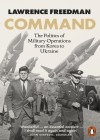The Politics of Military Operations from Korea to Ukraine
by Lawrence Freedman
Allen Lane, 2022, 608 pp
ISBN 9780241456996
Reviewed By: John Nash
In his latest book, Command: The Politics of Military Operations from Korea to Ukraine, Lawrence Freedman continues his long body of work looking at issues of strategy and command. As the book’s title indicates, Freedman examines conflicts ranging from the Korean War to the ongoing Russo-Ukraine war, in the latter case focusing heavily on events in 2014 and the years leading up to the 2022 full-scale Russian invasion. In addition to a solid introduction and thoughtful conclusion, there are 15 chapters. The majority of chapters deal with a discrete conflict or issue (e.g. the Cuban Missile Crisis or Falklands War). Two chapters vary from this format by focusing on a particular leader. Specifically, Chapter 4 looks at the leadership of Ariel Sharon over the course of his military and political careers, and Chapter 8 is concerned with Saddam Hussein. Importantly, the case studies Freedman uses are varied, including Western examples such as the French in Indochina and Algeria, as well as non-Western conflicts like the Pakistan Civil War and conflicts in the Congo, with ‘Che’ Guevara’s failed attempt at an anti-government uprising through to Laurent-Désiré Kabila’s eventual rise to power. As this wide range indicates, Freedman looks beyond command and leadership within Western or democratic systems, also illuminating the issues of war and strategy that bedevil military dictatorships and other non-democratic systems.
Political, social and economic factors—combined with the personalities of leaders and subordinates—mean that war, and by extension war leadership, is never the same. As Freedman observes in his introduction: ‘Command, therefore is not a simple matter. It is about much more than handing out orders and ensuring that they are enacted’.[1] Therefore, it is problematic to make assumptions about military effectiveness based solely on the political system of a particular country.
Notwithstanding the inevitable relevance of context and personality to the execution of command, Freedman teases out some universally applicable lessons, both at the political-diplomatic and military operational levels. In his final analysis of the Pakistan Civil War (which led to East Pakistan gaining independence as Bangladesh), Freedman concludes that President (and General) Yahya Khan ‘looked to a military rather than a political solution, yet he showed little grasp of what a military solution might require’.[2] In a similar vein, when examining NATO operations in Kosovo in 1999, Freedman observes that NATO’s idea that air operations with no ground commitment was an ideal ‘low-risk’ and ‘low-cost’ strategy was evidently flawed, ‘although it is not clear why something low-cost signals anything other than low political intent’.[3] Both examples evidence the inherent challenges to strategic-level thinking and how it can be easy to over-use, or indeed under-use, military power to achieve an objective. Further highlighting the importance of coordinating military efforts with diplomatic, political and social lines of effort, Freedman determines that the British plans to reconstruct Iraq post 2003 were hampered by an enduring opposition to the Iraq War within the British Foreign Office and Department for International Development. Their resultant reluctance to support reconstruction efforts led politicians to support a military-led rebuilding effort instead.[4] Unsurprisingly Freedman, a member of the 2003 Iraq Inquiry (Chilcot Inquiry), assesses that the British post-war strategy in southern Iraq was suboptimal.
Operational-level command effects are also explored by Freedman, once again illuminating common themes across time and space. Perhaps his most obvious premise is the need for joint effort. The Pakistani Army fighting in East Pakistan (now Bangladesh) was hampered by its lack of control over air or naval forces to support the ground war.[5] Similarly, during the 1972 North Vietnamese offensive against the South, the US command chain and lines of responsibility for air operations were far too complex.[6] The most egregious example of poorly allocated command responsibilities is the case of Argentinian forces during their invasion of the Falklands in 1982. On that occasion, Brigadier Menéndez (commander of the so-called Joint Force of the Malvinas Military Garrison) had three separate commands under him—land, air, sea—all with their own independent logistical and supply organisations.[7] While the deficiencies in such command arrangements may seem obvious to readers now, Freedman’s examples provide case study reminders of why a joint approach is generally a more effective command arrangement than when single services attempt to run their own wars.
The principal, most important and most delicate theme of the book is the issue of politico-military relations. This relationship cuts both ways, with some military commanders accused of being ‘too political’. A particularly notable example is Dwight D Eisenhower in the Second World War. Both the US and British political leaderships often accused Eisenhower of being more politician than general, without consideration of the fact that his ‘generalship was about preparing and directing large and complex military undertakings, involving various nationalities’.[8] In reality, an officer exercising such a high level of military responsibility could not avoid encroaching into territory deemed ‘political’. Going too far in this direction, however, has real risks. Undue interference in politics is arguably the reason that General MacArthur was fired by President Truman during the Korean War.
The politico-military dichotomy raises the question of when a military officer can or should disobey a direction given by the chain of command. Indeed, a self-proclaimed aim of Freedman’s work is to shine a light on this issue.[9] The corollary of such inquiry, however, is the degree to which politicians should become closely involved in military matters. For example, during the Cuban Missile Crisis President Kennedy was unfairly taken to task for interfering too much in military affairs. A similar accusation was made against both President Nixon and Secretary of State Kissinger during the Vietnam War—fairly. The ability of politicians to resist the temptation to intrude unnecessarily in military matters is a strong attribute, as is a basic understanding of military problems. One of the more revealing stories told by Freedman is a personal recollection of his interview with Margaret Thatcher. When asked about the main lesson from the Falklands War, she replied: ‘Everything takes much longer than you think it should.’[10] It is a lesson that should be heeded today by those who expect military results right now. A contemporary example is the unreasonable expectations placed on Ukrainian counter-offensives to make rapid headway against heavily entrenched Russian forces.
In Command: The Politics of Military Operations from Korea to Ukraine, Freedman concludes that the answer to effective command in military operations lies in cooperation between the military and civilians:
If there is a lesson from this book, it is not that the civilians and military must stick to their own spheres of influence, and not interfere in the other’s, but that they must engage constantly with each other.[11]
While this may not be a revelatory observation, it is a critical one nonetheless.
About the Reviewer
Dr John Nash is an Academic Research Officer at the Australian Army Research Centre. Previously he was a researcher at the Australian War Memorial for The Official History of Australian Operations in Iraq and Afghanistan, and Australian Peacekeeping Operations in East Timor. He was awarded a PhD from the Australian National University in July 2019. He is also a Lieutenant in the Royal Australian Naval Reserve, having completed nine years’ fulltime and seven years’ reserve service as a Maritime Warfare Officer. He was the inaugural winner of The McKenzie Prize for the Australian Naval Institute and Chief of Navy Essay Competition – Open Division, 2019. His most recent publication is Rulers of the Sea Maritime Strategy and Sea Power in Ancient Greece, 550–321 BCE, Volume 8 in the series ‘De Gruyter Studies in Military History’. Other publications include an article in the Journal of Indo-Pacific Affairs (March-April 2022) and the US Naval War College Review (Winter 2018, Vol.71).
Endnotes
[1] Lawrence Freedman, Command: The Politics of Military Operations from Korea to Ukraine (Allen Lane, 2022), p. 2.
[2] Ibid., p. 170.
[3] Ibid., p. 342.
[4] Ibid., pp. 445, 460.
[5] Ibid., p. 155.
[6] Ibid., p. 182.
[7] Ibid., pp. 227–228.
[8] Ibid., p. 6.
[9] Ibid., p. 29.
[10] Ibid., p. 245.
[11] Ibid., p. 515.


